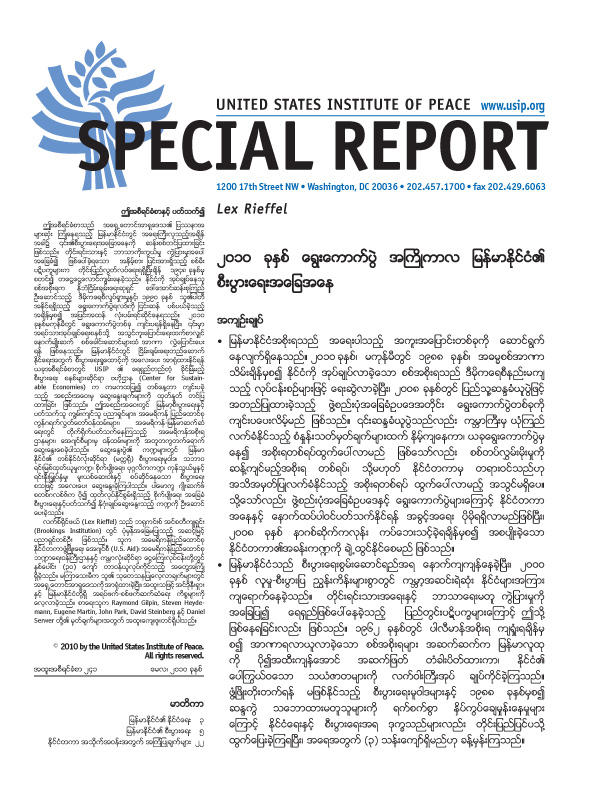The Economy of Burma/Myanmar on the Eve of the 2010 Elections (Burmese edition)
The government of Burma is undergoing a critical transition: Before the end of 2010, the military regime that has ruled the country since a palace coup in 1998 will hold an election based on a constitution drafted in a nondemocratic process and approved by a referendum in 2008. The referendum fell far short of global standards of credibility and the election is likely to yield a government that neither the antimilitary movement nor the international community views as legitimate. However, the constitution and election also may offer opportunities for further international involvement that began in the wake of Cyclone Nargis in 2008.

Summary
- The government of Burma is undergoing a critical transition: Before the end of 2010, the military regime that has ruled the country since a palace coup in 1998 will hold an election based on a constitution drafted in a nondemocratic process and approved by a referendum in 2008. The referendum fell far short of global standards of credibility and the election is likely to yield a government that neither the antimilitary movement nor the international community views as legitimate. However, the constitution and election also may offer opportunities for further international involvement that began in the wake of Cyclone Nargis in 2008.
- Burma's lagging economic performance--socioeconomic indicators placed it among the world's most impoverished in 2000--is due to a simmering internal conflict based on ethnic and religious differences. Successive military regimes after the failure of Burma's parliamentary government in 1962 have managed to further alienate the population and monopolize the benefits of Burma's abundant natural resources. Growth-disabling economic policies and brutal suppression of dissent since 1988 have caused an exodus of political and economic refugees estimated to be in excess of 3 million.
- However, Burma occupies a strategic space in the Southeast Asian region. It is a major supplier of natural gas to Thailand and could be a major agricultural exporter, as it was before World War II. Also, Burma is arguably the greatest obstacle to the 2015 integration objectives of the Association of Southeast Asian Nations (ASEAN), and its internal conlict contributes to tension between China and India.
- There is a glimmer of hope that the next government will consider economic policies conducive to sustainable economic growth, thereby improving the environment for political reconciliation. If so, the challenge for the international community will be to find ways to support economic policy changes in this direction that do not trigger a backlash from the country's military rulers. Though difficult, it may be possible to accomplish this through a patient economic strategy that involves more nuanced use of sanctions and effective collaboration with other actors in the region, particularly ASEAN.
About the Report
This report examines the economy of Burma at a crucial moment in Southeast Asia's most troubled country. A low-intensity conflict based on ethnic and religious differences has simmered since independence in 1948. The country's military rulers have been waging an existential struggle with a democratic movement led by Nobel laureate Aung San Suu Kyi since they repudiated her party's election victory in 1990. Before the end of 2010, an election will be held that is more about transferring power to a new generation of military officers than making a transition to civilian rule. To focus attention on the economic dimension of peacebuilding in Burma, this report draws on the discussion at a day-long workshop sponsored by USIP's Center for Sustainable Economies. The workshop brought together experts on key aspects of Burma's economy and employees from congress and U.S. government departments and agencies directly concerned with U.S. relations with Burma. The workshop sessions focused on macroeconomic policy, the extractive sectors, agriculture, the private sector, trade and investment, and the narcotics economy. Professor Joseph Stiglitz led the concluding session on a more productive agrarian economy.
Lex Rieffel is a nonresidnt senior fellow at the Brookings Institution. He has thirty years of experience working with the U.S. Agency for International Development, the U.S. Treasury Department, and the global financial industry. His recent research has focused on Southeast Asia, especially civil-military relations in Indonesia and Burma. The author is grateful for comments from Raymond Gilpin, Steven Heydemann, Eugene Martin, John Park, David Steinberg, and Daniel Serwer.
- Read the English version of this report



